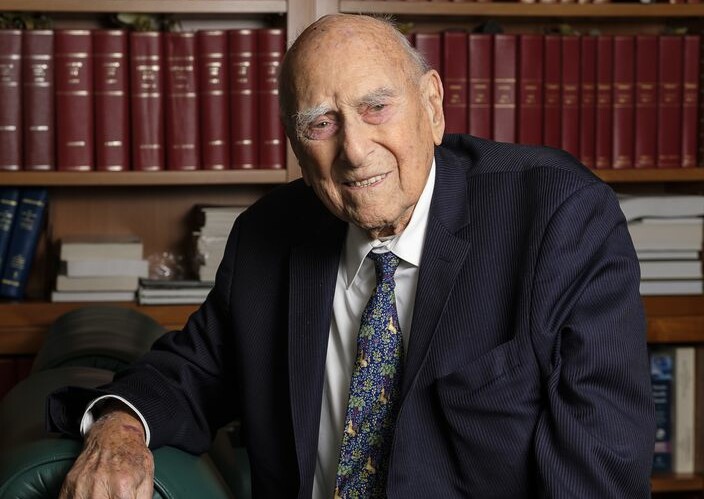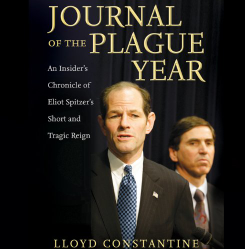Jack Weinstein one of the greatest American judges in history, and the greatest in “this boy’s life” died on June 15, two months shy of his 100th birthday. [1] When he retired from the federal bench at 98, after 53 years, he was carrying a full load of cases – and a lucky load it was – for the litigants and their champions. How was Jack Weinstein great? Let others count the thousands of ways (and they are) but HL will mention a few personal and idiosyncratic.

Thurgood Marshall
Weinstein was already a role model when and where HL grew up on THE ISLAND. Weinstein got there by way of Kansas, then Brooklyn and its Lincoln High School, where HL’s dad taught and coached football. Weinstein from Great Neck just across THE EXPRESSWAY from HL’s neighborhood was already a well-known legal lion. Some of that for being our (Nassau) County’s head attorney but more as a civil rights lawyer who had worked for Thurgood Marshall on Brown v. Board of Education of Topeka, not far from Weinstein’s birthplace in Wichita.
Weinstein’s association to that decision was a big deal for us back then in the early 1960s. We all remembered the day in 1954 that case was decided, the way we remembered the day Stalin died, the day Brooklyn finally won the Series, the day of THE CORONATION. And we all remembered and still watched the violence in Little Rock and many other places as federal marshals escorted little black girls and boys into newly desegregated public schools.

Little Rock, 1957
It was people like Jack Weinstein and Ralph Nader, and those two specifically for HL, that sent us to law school. It kept HL at Columbia Law despite an immediate and strong distaste for torts and contracts and their invidious comparison to the kind of international and constitutional law we were fed at liberal eastern liberal arts colleges. And by 2L there was Weinstein teaching us evidence – the author of The Rules of Evidence used by every litigant and every judge in federal court, including the Supremes. Jack’s course was so good that HL took it twice, once then and years later after several years of practice.
The most important moments in most federal cases occurs on the day of filing, when the clerk spins the drum and reads the name of the judge selected randomly – or so they tell you.
In 1976 HL hit the lottery for the first of several times. HL was a young legal services lawyer filing a civil rights case on behalf of a class of fully employed recipients of public assistance – the hard-working poor. The case was assigned to Judge Weinstein and in HL’s first appearance before him, HL had to convince him that a 3-Judge court was required to determine this federal constitutional challenge to federal and state law. The challenge was based on a fairly novel theory HL had devised. That day Weinstein sat in the Mineola branch of the United States District Court for the Eastern District of New York, whose main branch was in downtown Brooklyn, Mineola was close to where HL’s mother lived, so she came to see her boy perform, which he did for almost an hour. It ended with Weinstein ruling from the bench that he would ask the Chief Judge of the United States Court of Appeals for the Second Circuit to designate two additional judges and convene a constitutional 3-judge court. As the session ended, HL’s mother bolted to the front of the courtroom where Weinstein typically robe-less sat with the advocates, not above them on the bench wearing a costume. She went up to Weinstein and hugged and kissed him. HL wanted to die, but Jack instantly shot a knowing look that said “I’ve got a Jewish mother too. It’s alright. She’s proud of you.”

Jack Newfield
A few months later at the 3-judge court argument in Brooklyn, it was assumed that we were doomed, as the other two jurists were former Connecticut Governor Tom Meskill, a vigorous proponent of the very type of law that we were challenging and the other judge was a right-wing jurist, named by Jack Newfield of the Village Voice as the “dumbest judge east of the Mississippi.”
But the panel suffered HL to argue for two full hours. After which Weinstein dispatched his clerk, Denise Cote (now a distinguished federal judge as well), to deliver contemporaneous esteem for HL’s argument. As expected, we lost 2 to 1 with Weinstein writing a 46-page dissent. He invited HL into his chambers to express “gratitude” for our work, that had included a 200 page “Brandeis Brief” distilling many empirical studies of the way America’s welfare system punished recipients who worked and destroyed the incentives of those who wanted to work. In chambers Jack served us oranges and beverages. That sort of kindness from a federal judge to a young lawyer is never forgotten and goes a long way in shaping a career. Jack Weinstein did something like that for lawyers and litigants and the accused and convicted who came before him virtually every working day for 53 years. He often sat robe-less at the same table with defendants as he explained the sentence he was imposing. Jack was a mensch.
 In the following years HL had a few more cases and encounters with Weinstein. HL’s wife, as Assistant U.S. Attorney had many more. One of mine was the case that caused the law firm Constantine Cannon to be established against Time Warner. Five years after winning the lottery again, Time Warner surrendered with a jury seated awaiting opening arguments in Jack Weinstein’s courtroom.
In the following years HL had a few more cases and encounters with Weinstein. HL’s wife, as Assistant U.S. Attorney had many more. One of mine was the case that caused the law firm Constantine Cannon to be established against Time Warner. Five years after winning the lottery again, Time Warner surrendered with a jury seated awaiting opening arguments in Jack Weinstein’s courtroom.
That capitulation occurred after we ran the table, with Weinstein denying a string of motions filed by the truly brilliant lawyers of Cravath Swaine & Moore – all asking for various questions and the whole case to be taken away from jury determination and for it to be dismissed without trial. Weinstein trusted juries, their fairness and wisdom. He trusted the American legal system and during his 53 years he made that system fairer, more just and a far more humane and happy place to practice and seek justice. Upon retirement last year, Jack said he wanted to pursue a history master’s degree focused on the Jim Crow period. Like his many fans on Long Island, Jack never forgot why he went to law school and became a civil rights lawyer. We don’t know how far Jack got in the following 16 months but are sure he has earned the degree with highest honors.
Thank you, Judge Weinstein. You have not only earned your degree, but your peaceful rest.
[1] HL 140 borrows freely from HL 94, posted 2/18/2020, upon Jack Weinstein’s retirement from the federal bench when he was 98.5 and still carrying a full caseload.



0 Comments